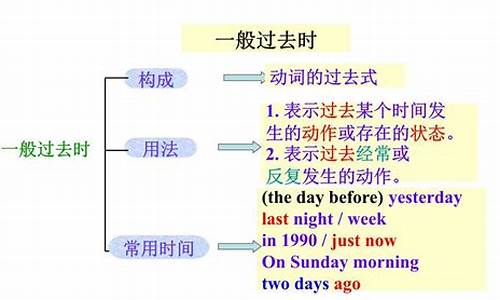英语一般过去时的句子_英语一般过去时的句子20句
1.英语好的帮下 初中学的7个时态 一个时态5个句子 帮造下 我英语学的不好
2.七年级下册英语的一般过去时的5个句子
3.英语一般过去时肯定句和否定句
4.一般过去式的句子(英语)

一、一般过去时的概念
一般过去时表示过去某个时间发生的动作或存在的状态。常和表示过去的时间状语连用。如:last year, yesterday等; 也可表示过去经常反复发生的动作,常和often, always等频率副词连用。
例如:①I saw him in the street yesterday. 昨天我在街上看见他了。
②Li Mei always went to school on foot last year. 去年李梅总是步行上学。
二、一般过去时的构成
我们主要来学习谓语动词为实义动词的`一般过去时的构成。
动词过去式的构成:
(1)规则动词过去式的构成有四条规则:
①一般在动词原形末尾直接加上-ed。如:look-looked。
②以不发音的字母e结尾的动词,去e再加-ed。如:live-lived。
③末尾只有一个辅音字母的重读闭音节,先双写这个辅音字母,再加-ed。如:stop-stopped。
④末尾是辅音字母+y结尾的动词,先变y为i,然后再加-ed。如:study-studied。
(2)不规则动词的过去式需特殊记忆。如:am(is)-was, are-were, go-went, come-came, take-took, he (has)-had等。
三、 一般过去时的几种句型
肯定句结构为:主语+动词的过去式+其它。如:He went to the toy store yesterday. 他昨天去玩具店了。
否定句结构为:主语+did not (didn't)+动词原形+其它。如:He didn't go to the toy store yesterday. 他昨天没去玩具店。
一般过去时的一般疑问句的构成:Did+主语+动词原形+其它?如:
1) -Did you go to Beijing last week?
-Yes, we did. (No, we didn't.)
2) -Did you meet the businessman before?
-No, I didn't. (Yes, I did.)
一般过去时的特殊疑问句的构成:疑问词+did+主语+动词原形+其它?如:
1) -What did you do last night?
-I did my homework.
2) -Where did you go last week?
-I went to Shanghai with my parents.
一般过去时口诀
一般过去时并不难,表示过去动作、状态记心间。
动词要用过去式,时间状语句末站。
否定句很简单,didn't 站在动词原形前,其它部分不要变。
一般疑问句也好变,did放在句子前,主语、动词原形、其它部分依次站。
特殊疑问句也简单,疑问词加一般疑问句记心间。
英语好的帮下 初中学的7个时态 一个时态5个句子 帮造下 我英语学的不好
综述:
1、现在进行时
Now,we are hing a great house cleaning.Everyone is doing chores.My father is cleaning the living room.My mother is sweeping the floor.
My sister is cleaning her room,My brother is taking out the trash. I am washing the dishes. Together with our efforts,our house becomes much more beautiful .We feel tired but hy.What a meaningful day!
现在,我们正在进行一次大扫除。每个人都在做家务。我爸爸在打扫客厅。我妈妈在扫地。我姐姐在打扫房间,我哥哥在倒垃圾。我正在洗盘子。加上我们的努力,我们的房子变得更漂亮了。我们感到累但很开心。多么有意义的一天!
2、一般过去时
Last Sunday,I went to old people's house with my friends.We bought flowers and gifts for these old people.They were very moved.
Then,we cleaned their house and washed their clothes.Boys told jokes to make them laugh.Girls danced and sang songs for them.Old people felt very hy.They said that they always felt lonely.So they thanks to us.We all had a hy day in the old people 'house.
上周日,我和朋友们去了老人家。我们给这些老人买了鲜花和礼物。他们非常感动。然后,我们打扫了他们的房子,洗了他们的衣服。男孩们讲笑话逗他们笑。女孩们为他们跳舞唱歌。老人们感到非常高兴。他们说他们总是感到孤独。所以他们感谢我们。我们都在老人家度过了快乐的一天。
3、一般将来时
Different people he different dreams. When I grow up,I will be a reporter.I will meet many interesting people.Such as actors ,engineers and soldiers.
I will learn many things from these people.It will be a chance for me to get more knowledge.I will also go many beautifui places and eat delicious food.I wish my dream would come true in the future.
不同的人有不同的梦想。当我长大后,我会成为一名记者。我会遇到很多有趣的人。比如演员、工程师和士兵。我将从这些人身上学到很多东西。这将是我获得更多知识的机会。我还将去许多美丽的地方,吃美味的食物。我希望我的梦想在未来成真。
英语翻译技巧:
第一、省略翻译法
这与最开始提到的增译法相反,就是要求你把不符合汉语,或者英语的表达的方式、思维的习惯或者语言的习惯的部分删去,以免使所翻译出的句子沉杂累赘。
第二、合并法
合并翻译法就是把多个短句子或者简单句合并到一起,形成一个复合句或者说复杂句,多出现在汉译英的题目里出现,比如最后会翻译成定语从句、状语从句、宾语从句等等。
这是因为汉语句子里面喜欢所谓的“形散神不散”,即句子结构松散,但其中的语意又是紧密相连的,所以为了表达出这种感觉,汉语多用简单句进行写作。而英语则不同,它比较强调形式,结构严谨,所以会多用复杂句、长句。因此,汉译英时还需要注意介词、连词、分词的使用。
七年级下册英语的一般过去时的5个句子
1.一般现在时
Rice is grown in the south of the states.
大米长在南方的州上.
We are not allowed to enter the chemistry lab without a teacher.
我们不允许在没有老师陪同的情况下进入实验室.
Light trels faster than sound.
光的速度超过声音的速度.
Two and four makes six.
二加四等于六.
The moon moves round the earth.
月亮绕着地球转.
2.一般过去时
The building of a new car factory was agreed on last month.
一家新汽车工厂的建筑上个月已经被同意了.
He had a strange way of making his classes lively and his lessons were not easily forgotten.
他有一种特殊的使课堂活跃的方法,他的课总是不容易被遗忘.
I did my homework yesterday.
我昨天做了我的家庭作业.
He said he wanted try it again.
他说他想再试一试.
It was rainy yesterday.
昨天是雨天.
3.一般将来时
He will sweep the floor tomorrow.他将明天扫地.
Cars will be sent abroad by sea.
汽车将经由水路运往国外.
Plenty of jobs will be given to school-leers.
学校毕业生将有大量工作机会.
They will find you if you hide somewhere.
如果你藏起来他们将会找到你.
China will be the best after several years.
若干年之后,中国将是最好的.
4.过去将来时
The manager said the project would be completed by the end of the year.
经理说这项将在今年年底完成.
The workers told me that the car would be mended as soon as possible.
工人们告诉我这辆汽车将尽快被修好.
She was sixty-six.In three years,she would be sixty-nine.
她66岁了.三年后,她是69岁.
She told us that she would not go with us,if it rained.
她告诉我们,如果下雨,她就不和我们一起去了.
I didn''t know how to do it.What would be their ideas?
我不知如何去做,他们会有什么想法呢?
5.现在进行时
English lessons are being broadcasted on the radio.
广播正在播放英语课程.
The rooms are being painted.
这些房间正在被粉刷.
You are making rapid progress.
你正在不断取得快速的进步.
It is blowing hard.
风正刮得厉害.
Who are you waiting for?
你正在等谁?
6.过去进行时
——Why didn't they drive there on time?
----Because the road was being mended.
---为什么他们没有准时开车到那儿?
---因为那条路正在修理当中.
Trees were being planted here this time last year.
去年的这个时候这里正在种许多树.
My brother fell while he was riding his bicycle and hurt himself.
我弟弟在骑自行车时摔下来伤了自己.
It was raining when they left the station.
他们离开站台时下雨了.
When I got to the top of the mountain,the sun was shining.
当我到达山顶的时候,正是烈日当头.
7.现在完成时
I he been told the sports meet might be put off.
我已经说过运动会可能会推迟举行.
The price has been brought down.
价格已经下降.
I he ever been to Paris.
我从来没去过巴黎.
I he lost my pen.
我丢了我的钢笔.
He you seen my pen?
你见我的钢笔了么?
8.过去完成时
When I got to the theatre,I found the tickets had already been sold out.
当我到达剧院的时候,我发现票已经卖完了.
He had been considered to be a great leader.
他曾经被认为是最好的领导.
We had just had our breakfast when Tom came in.
当汤姆进来的时候,我们已经吃完早饭了.
By the end of last year they had turned out 5,000 bicycles.
到去年年底为止,他们生产了5,000辆自行车.
The experiment had been finished by 4 o’clock yesterday afternoon.
这个实验昨天下午四点前就完成了.
英语一般过去时肯定句和否定句
1)I had a word with Julia this morning.今天早晨,我跟朱莉娅说了几句话。
2)He smoked many cigarettes a day until he ge up. 他没有戒烟的那阵子,抽烟抽得可凶了。3)The boy opened his eyes for a moment,looked at the captain,and then died.
那男孩把眼睛张开了一会儿,看看船长,然后就去世了。
4)I never drank wine.我以前从不喝酒。
5)I thought you were ill.我以为你病了呢。
6)I didn''t know you were in Paris.我不知道你在巴黎。
7)Mr. Smith bought a new car yesterday.史密斯先生昨天买了一辆新车
8)They were here only a few minutes ago.几分钟前他们还在这里。
9)He was here only a few minutes ago.仅仅几分钟前他还在这里。
10)I came home just now.我刚回到家。
一般过去式的句子(英语)
一般过去时(be动词的用法)
be动词的变化:is/am——was;are——were
was/were和人称的搭配:
was:I/he/she/it/单数第三人称/可数名词单数/不可数名词
were:we/you/they/复数名词/可数名词复数
肯定句:主语+was/were+其他+时间状语
否定句:主语+was/were+not+其他+时间状语
例如:Mary?was? a?top? studentin? her class?at? that? time。(肯定句)
?玛丽那个时候在他们班上是一位优秀学生。(表示肯定)
We?were?not?here? last? night?。(否定句) 我们昨晚并不在这里。(表示否定)一般过去时(实义动词的用法,助动词只有did)
肯定句:主语+v.(动词过去式)+其他+时间状语
否定句:主语+didn't+v.(动词原形)+其他+时间状语
例如:She? went? to? the? shop? last? Sunday.(肯定句)
她上一个星期天去了商店。(表示肯定)?I? didn't? get? up? at? six? yesterday.? (否定句)
我昨天不是在六点钟起床。(表示否定)总之,上面的叙述看起来比较复杂,其实一般过去时的肯定句主要是通过使用动词的过去式表示出来的,而否定句是借助于动词动词“did”和在句子中加否定词“not”加以实现的,其总的结构形式可以做如如下小结:
肯定句——主语+be动词/实义动词过去式+其他+时间状语(表示肯定,肯定过去的事实)
否定句——主语+be动词过去式/didn't+动词原形+?其他+时间状语(表示否定,否定过去的事实)。
这是问题的实质,搞清楚了,也就不难掌握和应用了。希望初学者在学习中注意观察体会和理解,学会正确运用。
一般过去式的句子是指表示过去某个时间内已经发生或完成的动作、状态或的语句。通常由谓语动词的过去式和其他补充成分(如主语、宾语等)组成。
一、构成
1、一般过去时的动词形式常见有两种:普通过去式和助动词+动词不定式的过去完成式。普通过去式的构成方式是在动词原形后面加上-ed,如walk-walked,cook-cooked等。
2、而助动词+动词不定式的过去完成式则是用had+动词过去分词形式,如had walked,had cooked。
二、用法
在英语句子中,一般过去时常在过去的时间段内描述已经完成的行为或动作。可以说,过去时间段内涉及到任何物品或都可以用一般过去时来描述,此外,在虚拟条件句型中,一般过去时也常常出现。
三、常见问题
1、一般过去时与完成时有什么区别?两者都是指在过去发生的事情,但一般过去时只指过去的某个时间点上所发生的行为或状态,而完成时则强调的是过去某个时间段的完成情况。
2、一般过去式有哪些规则动词?非规则动词又如何构成?规则动词的构成方式总体遵循动词原形加-ed的规则,非规则动词则没有规律可言,需要通过记忆来掌握它们的过去式和过去分词。
3、过去式的使用时态存在哪些要点需要注意?一般过去时通常带有过去的时间标志,此外,需要注意动词不加-s/es,并且不变化的情况,如I,You,He/She/It,We,They去+动词原形起因此形式。
声明:本站所有文章资源内容,如无特殊说明或标注,均为采集网络资源。如若本站内容侵犯了原著者的合法权益,可联系本站删除。

